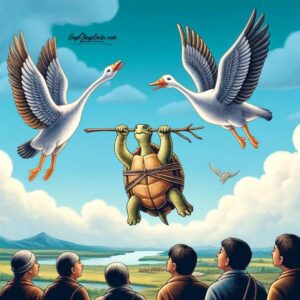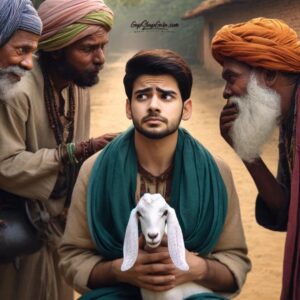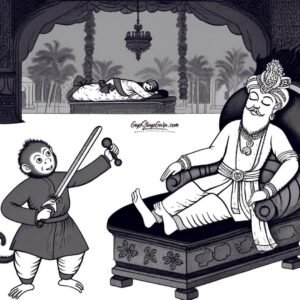The Panchatantra Short Stories are a collection of ancient Indian tales that have delighted children for many years. These fascinating Panchatantra Tales are full of talking and acting animals, and they do more than just entertain. They teach important life lessons and morals. Each Panchatantra story is special. They give children wisdom in a fun and educational way. Let’s start a journey through 25 of these amazing stories, where each one teaches a different lesson. Here’s the full story of “The Thirsty Crow” in English.
Panchatantra Short Stories In English With Moral
The Panchatantra Short Stories are special because they teach important lessons in a simple way. These stories feature animals as the main characters, which makes them fun and interesting for kids. These animals act like humans, showing both good and bad traits, and face different challenges and adventures. As the animals go on these adventures, children learn about important qualities like honesty, bravery, wisdom, and humility. The beauty of these Panchatantra Stories In English is how they make it easy for kids to understand big life lessons.

The Monkey and the Crocodile
Panchatantra Short Stories | In a Panchatantra story, there was a monkey who lived happily on a fruit tree by a river. One day, a crocodile swam up to the tree. The friendly monkey offered him some fruits, and they became good friends. However, the crocodile’s wife grew jealous. She wanted the monkey’s heart, believing it would be as sweet as the fruits he ate. So, the crocodile invited the monkey to his home.

While they were travelling, the crocodile shared his wife’s plan. The quick-thinking monkey then told the crocodile he had left his heart on the tree, and they needed to go back to retrieve it. The unsuspecting crocodile swam back to the tree, where the monkey quickly escaped to safety. Read the full story here: The Monkey and Crocodile Full Story in English With Moral
Moral: Quick thinking can save you from difficult situations.
The Tortoise and the Geese
Panchatantra Short Stories | In one of the Panchatantra tales, a tortoise named Gomukha lived in a pond and was friends with two geese. He loved hearing their stories about distant places and longed to see the world with them. The geese came up with a plan: they would each hold a stick in their beaks, and Gomukha would hold the middle of the stick in his mouth.

However, he was warned not to speak, or he would fall. As they flew, people below noticed and were amazed. Overwhelmed by the urge to speak, Gomukha opened his mouth to talk and tragically fell to the ground, losing his life. This story highlights the importance of thinking before acting and the risks of speaking at the wrong time.
Moral: Sometimes, staying silent is the best option.
The Crows and the Cobra
Panchatantra Short Stories | In this Panchatantra story, a pair of crows lived in a large banyan tree with their young ones. Unfortunately, a cobra also lived in a hole in the same tree and would eat their babies. Heartbroken and desperate, the crows sought advice from a wise fox. The fox came up with a clever plan.

He suggested that the crows steal a necklace from the nearby palace and drop it into the cobra’s hole. When the palace guards came looking for the necklace, they found it with the cobra and killed it. Thanks to this plan, the crows were able to get rid of their enemy and protect their future young ones.
Moral: Teamwork and clever thinking can overcome big challenges.
The Fox and the Grapes

Panchatantra Short Stories | A hungry fox saw some grapes hanging from a tree. They looked ripe and juicy, perfect for a meal. He tried to reach them but found they were too high. He jumped and leapt but to no avail. Tired and defeated, he finally gave up. As he walked away, he muttered, “Those grapes are probably sour anyway.” We learn from this story that sometimes when we cannot achieve something, we pretend it is not worth having in the first place. The Fox And The Grapes Full Story
Moral: It’s easy to despise what you can’t have.
The Clever Crab and the Deceitful Crane
Panchatantra Short Stories | In this tale from the Panchatantra, a crane used to easily catch fish from a pond. However, as he grew older, it became harder for him to catch fish. To solve his problem, the crane came up with a deceitful plan. He told the fish he would take them to a bigger, better pond. But instead of helping them, he took them one by one and ate them.

A wise crab asked to be taken to the new pond too. During their journey, the crab realized the crane’s trick when they reached a dry spot meant for his doom. Before the crane could harm him, the crab quickly grabbed the crane’s neck with his claws and squeezed tightly until the crane died. This brave act saved all the remaining fish in the pond.
Moral: Evil actions eventually lead to trouble.
The Merchant and the Deceitful Friend
In this Panchatantra Story, a merchant left an iron balance with his friend for safekeeping. When he returned to retrieve it, the friend deceitfully claimed that mice had eaten the iron balance. Wanting to teach his friend a lesson, the merchant later took his friend’s son under the pretence of going on a trip but secretly hid the boy.

When the friend became frantic looking for his son, the merchant told him a hawk had taken the boy away. The friend immediately objected, saying hawks cannot carry off humans. The merchant then cleverly pointed out that if hawks can’t carry a child, then mice certainly can’t eat iron. Realizing his deceit had been exposed, the friend admitted his wrongdoing and returned the balance. Related: Honesty Is the Best Policy – 5 Short Stories With Moral
Moral: Deceit often meets a fitting response.
The Elephant and the Sparrow
Panchatantra English Story | In this Panchatantra story, a sparrow and her friends were living happily in a forest until an elephant destroyed her nest and eggs. Heartbroken, the sparrow sought help from a woodpecker, a fly, and a frog to deal with the elephant. They came up with a clever plan: the fly would distract the elephant by buzzing in his ears, the woodpecker would peck at his eyes, blinding him, and the frog would lead him to a swamp.

Confused and blinded, the elephant followed the sound of the frog’s croaks and ended up falling into the swamp, where he perished. This story shows us how even the mighty can be defeated with clever teamwork.
Moral: Unity and intelligence are powerful tools, even against the strongest foes.
The Washer’s Donkey and the Tiger Skin
Story Of Panchatantra In English | In this Panchatantra story, a washerman’s donkey, worn out from carrying heavy loads, stumbled upon a tiger skin one day. Seeing an opportunity, he draped the skin over himself and roamed the forest, terrifying all the animals who mistook him for a real tiger. His ruse worked well until he encountered a real tiger.

Frightened by the sudden meeting, the donkey couldn’t help but bray loudly. The sound revealed his true identity, and the other animals, realizing they had been fooled, chased him away. The real tiger watched the scene, amused by the donkey’s foolish attempt to deceive.
Moral: Be true to yourself and avoid trying to deceive others; it can lead to trouble.
The Blue Jackal
Stories In Panchatantra | In this Panchatantra tale, a jackal accidentally fell into a tub of blue dye in a village. When he wandered back to the forest, his unusual blue colour frightened all the animals, who thought he was some strange, new creature. Seizing the opportunity, the clever jackal declared himself the king of the forest, and all the animals believed him. He relished his newfound status as their leader.

However, one day, he heard a pack of jackals howling nearby. Overcome by instinct, he forgot his disguise and howled back. Hearing this, the other animals realized he was just a regular jackal and chased him away. This story teaches us that one’s true nature will eventually come to light.
Moral: You cannot hide your true self, no matter how hard you try.
The Wise Old Bird

Panchatantra Moral Stories In English | In a dense forest, there was a tree where many birds lived. An old, wise bird warned them about a hunter who had spread a net to catch them. He advised the birds to fly away immediately. However, the younger birds ignored the warning and were caught in the net. Realising their mistake, they sought the wise bird’s help. He advised them to pretend to be dead. When the hunter came and found the birds seemingly lifeless, he removed them from the net. At that moment, the birds flew away, saving themselves. This story teaches the importance of listening to wise advice and working together in difficult times. Related: Unity Is Strength – 5 Inspirational Stories for Kids
Moral: Wisdom and unity can help overcome challenges.
The Rabbit and the Lion
This Story Of Panchatantra In English With Moral is about a brave rabbit who saved all the animals from a tyrant lion. The lion was eating up all the animals in the forest. To stop this, the animals offered the lion one animal daily. When it was the rabbit’s turn, he came up with a plan. He took a long time to reach the lion, making the lion very angry.

The rabbit then told the lion about another big lion in the forest who wanted to take over his territory. The lion followed the rabbit to a well and saw his reflection. Mistaking it for the other lion, he attacked and fell into the well. This clever plan by the rabbit saved all the animals. Lion And Rabbit Full Story With Moral For Kids
Moral: Intelligence and bravery can overcome even the mightiest foes.
The Four Friends and the Hunter
Panchatantra Ki Kahaniya In English | Four friends—a deer, a crow, a mouse, and a turtle—lived in a forest. One day, a hunter trapped the deer. The other three friends came up with a plan to save him. The crow pretended to be dead near the hunter’s net to draw his attention. While the hunter was distracted by the crow, the mouse swiftly cut through the net, freeing the deer.

Meanwhile, the turtle went to a nearby pond. When the hunter saw the turtle, he dropped the crow to catch it. This allowed the crow to fly away safely. And all the friends were safe again. We learn from this story that we can overcome difficult situations by helping each other and working together. Related: Top 5 Short Stories On Friendship With Moral For Kids
Moral: Friendship and teamwork can overcome great challenges.
The Brahmin and the Goat
Panchatantra Moral Stories | A Brahmin once received a goat as a gift and was happily taking it home. Along the way, three crooks who wanted the goat for themselves devised a plan to trick him. They approached him one by one; the first crook told the Brahmin that he was carrying a dog, the second said it was a calf, and the third claimed it was a dead donkey.

Confused and scared by their comments, the Brahmin began to doubt what he was carrying. Fearing ridicule or that he might be under some spell, he dropped the goat and ran away. The crooks then seized the opportunity, took the goat, and celebrated their cunning success. This story reminds us of the importance of trusting our own knowledge and judgment rather than being influenced by the misleading opinions of others. Related: 10 Inspiring Short Ramayana Stories For Kids With Moral
Moral: Don’t let false advice influence you; instead, trust your own judgment.
The King and His Loyal Monkey
Short Story Of Panchatantra In English | A king had a pet monkey who was extremely loyal but often acted without thinking things through. One day, while the king was taking a nap, a fly landed on his chest. Eager to protect his master, the monkey picked up a sword to swat the fly away. Unfortunately, in his haste and without thinking, the monkey swung the sword and accidentally hurt the king badly.

This story illustrates that even actions done with the best intentions can lead to serious consequences if not thought through. It teaches us the importance of careful consideration and judgment, especially in delicate situations. Related: The Monkey And The Cap Seller Story With Moral For Kids
Moral: It’s important to think before you act, especially in situations requiring careful judgment.
The Heron and the Crab

Short Stories Panchatantra | A heron lived near a pond and was too lazy to hunt for fish. He tricked the fish, claiming the pond was drying up and he could take them to a bigger pond. Each day, he would eat the fish he carried. A wise crab asked the heron to take him to the new pond. Midway through, the crab realised the heron’s deceit. Before the heron could eat him, the crab grabbed the heron’s neck with his strong claws and killed him. This saved the crab and the remaining fish in the pond.
Moral: Cunningness can backfire, and wisdom can save lives.
The Two Geese and the Talkative Turtle
Moral Stories From Panchatantra | Two geese and a turtle were great friends who lived together in a pond. When a drought threatened their home by drying up the pond, they decided to move to a new location. The plan was for the geese to carry the turtle by flying with a stick held between their beaks, which the turtle would grasp in his mouth without speaking.

However, as they flew over a town, people noticed the strange sight and laughed. Unable to resist responding, the turtle opened his mouth to speak, forgetting his crucial task. As soon as he spoke, he lost his grip on the stick, fell to the ground, and lost his life. This tragic incident underscores the importance of following good advice and the severe consequences of ignoring it.
Moral: Sometimes, staying silent is the best choice.
The Mouse and the Lion
Moral Stories Panchatantra | One day, a small mouse accidentally ran over a sleeping lion, waking him up. The startled lion quickly captured the tiny mouse. Frightened, the mouse pleaded for his life, promising that he might be able to help the lion someday if he let him go. Amused by the thought that such a small creature could ever help him, the lion laughed and released the mouse.

Later, the lion found himself caught in a hunter’s net, unable to escape. He roared in distress, and the little mouse heard him. Remembering his promise, the mouse rushed to the lion and quickly gnawed through the net, setting the lion free. This story illustrates that help can come from the most unexpected places, and even the smallest friends can make a big difference. The Lion and The Mouse: Full Story of Friendship For Kids
Moral: Every act of kindness is never wasted.
The Bird with Two Heads
Panchatantra Tales | There was a unique bird with two heads but only one stomach. The heads would take turns eating to nourish their shared body. One day, one of the heads found a particularly delicious fruit. Driven by selfishness, it chose not to share the fruit with its other head. Feeling hurt and angry, the other head sought revenge.

In its anger, the second head found a fruit that was poisonous and decided to eat it, despite knowing the consequences. Since they shared the same stomach, the poison affected both heads, leading to their demise. This story highlights the dire consequences of selfishness and underscores the importance of cooperation and sharing.
Moral: Unity and harmony lead to survival; discord and selfishness lead to downfall.
The Monkeys and the Bell
Stories Of Panchatantra In English With Moral | A troop of monkeys discovered a bell in the forest. Curious and excited, they began playing with it, ringing it loudly. The sound echoed all the way to the nearby village. The villagers, hearing the constant ringing, assumed it signalled danger, perhaps an approaching predator or enemy. In fear, they quickly fled their homes, leaving the village empty.

Seeing the deserted village, the monkeys, amused and curious, moved in and took over. However, once the villagers realized there was no real danger and that they had been frightened by monkeys playing with a bell, they returned. They easily drove the amused but harmless monkeys back into the forest. This tale illustrates how misunderstandings and fear can lead to unnecessary panic and chaos.
Moral: Act based on understanding, not fear.
The Sage and the Mouse
Short Stories Panchatantra English | Once upon a time, a sage found a small mouse and, using his magical powers, transformed it into a girl. He raised her as his own daughter, providing her with love and education. When the girl reached a marriageable age, the sage wanted to find the most powerful and suitable husband for her.

He first offered her the sun, known for its brightness and strength. However, she declined, saying the sun was too intense. Next, he suggested the clouds, which could cover the sun, but she found them too fickle. The wind was offered next for its ability to blow the clouds, yet she thought it was too inconsistent. Then came the mountain, which could withstand the wind, but she found it too rigid.
Finally, understanding her heart, the sage asked if she would prefer a mouse like her original form. She agreed, feeling a true connection and comfort with someone like herself. Recognizing her happiness, the sage transformed her back into a mouse, and she happily married a mouse. This story underscores the importance of staying true to one’s nature and finding comfort in one’s own identity.
Moral: Be true to yourself and find happiness in who you are.
The Crow and the Serpent
Stories From Panchatantra With Moral | A crow and his wife had built their nest on a tree, where they hoped to raise their young. However, a serpent living in a hole in the same tree posed a constant threat by eating their eggs. Unable to defeat the serpent by themselves, the crow sought the help of a clever jackal.

The jackal came up with a cunning plan. He advised the crow to steal some of the queen’s jewellery and drop it into the serpent’s hole. The crow followed this advice, and when the royal guards came searching for the missing jewellery, they discovered the serpent in the hole. The guards killed the serpent to retrieve the jewellery, thus inadvertently saving the crow’s future offspring.
This story illustrates that sometimes, using indirect methods can be more effective than direct confrontation, especially against more powerful adversaries. Related: Having A Best Friend Moral Story For Children
Moral: Intelligence and indirect strategies can overcome powerful enemies.
The Brahmin, the Thief, and the Demon
Panchatantra Story Books | A Brahmin was once gifted a young calf, which he cherished greatly. One night, a thief, coveting the calf, decided to steal it. However, unbeknownst to both the Brahmin and the thief, a demon who punished anyone speaking at night was lurking nearby.

As the thief attempted to take the calf away, the calf mooed loudly, waking the Brahmin. Instinctively, the Brahmin spoke out. The demon, drawn by the sound of the voice, swooped in. Expecting to punish the Brahmin, the demon instead encountered the thief. Misunderstanding the situation, the demon killed the thief, thereby inadvertently saving both the Brahmin and the calf.
This story illustrates how unintended consequences can result from our actions and how, sometimes, fortune may favour us in unexpected ways.
Moral: Fortune can be unpredictable, and sometimes luck can save us from misfortune.
The Fisher and the Little Fish
Stories From Panchatantra Book | A fisherman was casting his net in the river when he caught a small fish. The fish, desperate to escape, pleaded with the fisherman, promising that if released, it would grow much larger and could be caught again later for a better reward.

The fisherman thought carefully about the fish’s plea. He considered that the small fish might not survive if released back into the river, or that he might never catch it again. Weighing the certainty of the small catch in his hand against the uncertainty of a future catch, he decided to keep the fish.
This story underscores the value of appreciating and valuing what we currently have rather than always hoping for more in the future, which may lead to losing everything.
Moral: It’s better to be content with what you have than to always hope for more and risk losing everything.
FAQs about Panchatantra Short Stories
What are the Panchatantra Short Stories? Why is it important?
The Panchatantra Short Stories is a collection of ancient Indian fables written in Sanskrit. It is important because it’s not just a book of stories but a book of moral lessons that have influenced the moral fabric of children for generations.
Who wrote the Panchatantra Short Stories?
The Panchatantra Short Stories are traditionally attributed to Vishnu Sharma, an ancient Indian scholar. However, the stories themselves are likely a collection from various authors over time.
How old are the Panchatantra Short Stories?
The Panchatantra dates back to at least the 3rd century BCE, making it over 2,300 years old.
Are Panchatantra Short Stories only for children?
Despite the fact that Panchatantra stories frequently feature animal characters and moral lessons aimed at children, people of all ages enjoy them for their wisdom and universal themes.
How do Panchatantra Short Stories teach morals?
Panchatantra Short Stories use animal characters and engaging narratives to illustrate moral and ethical lessons. The stories often conclude with a moral, making the lesson clear and memorable.
Summary
The Panchatantra Short Stories have been an essential part of children’s literature in India for centuries. These stories are filled with memorable animal characters and captivating narratives that not only entertain but also teach valuable life lessons. Through tales of intelligence, wit, unity, and honesty, children learn about the consequences of their actions and the importance of virtues.
As children today face their own challenges and adventures, the timeless wisdom of the Panchatantra continues to guide them, offering lessons that are as relevant and instructive now as they have always been, helping them navigate a life of understanding and virtue.

Comments are closed.